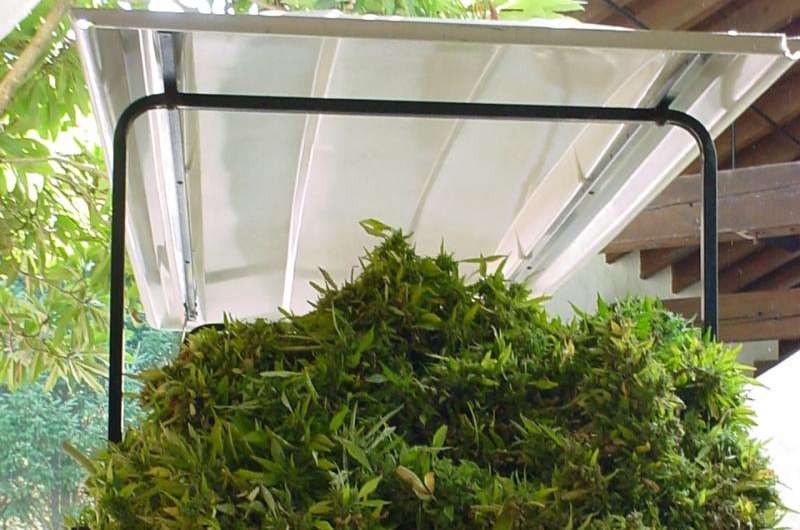GMOs and cannabis

If there's a topic even more politicized than the US presidential election, it's GMOs . (GMOs are genetically modified organisms, the products of genetic engineering, and opposition to them usually centers on GM crop plants.)
So it's not a surprise that there's been considerable pushback against Danny Hakim's recent New York Times takeout on GMOs. The piece seems to claim that GM crops have been a failure because they neither increase yields nor reduce pesticide use. It relies on a statistical comparison of North America (which grows GMOs) and Western Europe (which doesn't.)
The pushback, much of it persuasive, accuses Hakim of selective statisticizing. Some of this made my ears prick up in particular because it comes from sources you might expect to adore an anti-GMO piece on the front page of the Times, like Mother Jones and Grist.
And indeed, Mother Jones did huzzah at first, in a Tom Philphott post that called the article elegant and in-depth. But four days later, Mother Jones's Kevin Drum retorted with a post calling attention to Nathanael Johnson's Hakim critique at Grist.
And that's the place to begin: with Grist's Nathanael Johnson. IMO Johnson has for years been our most dispassionate and trustworthy analyst on the politics of crop science. His post on Hakim's piece appeared first at Grist but was reprinted at Vox.
Johnson's summary: "f you take the most mild interpretation of the piece—GMOs haven't dramatically improved yields, but they are useful—then it's really not news. . . If your takeaway from the piece is that GMOs just aren't useful, then it runs contrary to loads of evidence—which the story almost completely omits. And it makes comparisons that sound compelling, but don't actually tell you much about the state of farming."
One example: Hakim cites the US, which has reduced insecticides by 33% but increased herbicide spraying by 20% percent over 20 years. He compares the US with France, where insecticide use is down by 65% and herbicide spraying by 36%. But Johnson points out that France was using "crazy-high" amounts of pesticide 20 years ago and is only now bringing use down to US levels–and that, furthermore, pesticide use has been increasing in other parts of Europe.
Johnson also complains that the Times piece treats GMOs as a single entity. But they aren't. They should be judged, both risks and benefits, as individual crops. And while Europe rejected GMOs, it grows plenty of crops whose genes were altered by other means, such as mutagenesis. He concludes, "Even if we decide that genetic engineering isn't worth the risks, we'll face risks in other forms of breeding."
Other critiques of note:
Steven Novella at Neurologica calls the Times piece "a good example of what happens when a journalist writes about a complex and contentious topic and allows their narrative to overtake the facts. The article, 'Doubts About the Promised Bounty of Genetically Modified Crops,' declares the narrative in the headline."
Novella also accuses Hakim of cherry-picking data. His conclusion: The article "was a hack piece with a biased narrative that is nothing more than a rehash of tired anti-GMO tropes that have already been widely deconstructed. He is entering this conversation late, and isn't up to speed."
Agricultural economist Graham Brookes's post at the Genetic Literacy Project tackles Hakim's main claims about crop yield and pesticide use, drawing counterarguments from the scientific literature. Also at GLP, Marc Brazeau's long analysis of pesticide use offers reassurance but does not deal directly with the Times piece.
I'm not bothering with the hack slams from the usual reflexive GMO apologists. Kavin Senapathy summarized some of these at Forbes, but they are not worth your time.

My takeaways:
The selective use of statistics in this piece was kind of surprising for the Times. I know little of Hakim's background, although I see he shared a 2009 Pulitzer for reporting on New York governor Eliot Spitzer's sex scandal. I can't help wondering if Novella is right, that the piece was produced by someone newly come to the now-ancient and highly political dispute over GMOs. This is a topic where experience really, really counts. Really.
And if there's one thing we should have learned, it's not to look at GMOs as A Thing. Case-by-case is the only sort of analysis that makes sense. But of course case-by-case means lots of detail and a very long piece, not a popular approach for writers (or editors.) This was a point stressed in the exhaustive and authoritative (free!) report on GMOs from the National Academy of Sciences, which I wrote about here earlier this year.
Legal marijuana for chronic pain and other human conditions
Last week, the topic here was John Oliver's rant about unnecessary deaths from opioid use, which led, inevitably, to pointing out that we lack satisfactory remedies for chronic pain. One increasingly popular attempt to fill that gap is use of cannabis. Prescriptions for medical marijuana, now legal in several states, are most commonly written for chronic pain. Marijuana users say it really works. These numerous anecdotes are all we have, a poor substitute for our largely nonexistent data.
Is pot a real alternative to the inadequacies of other analgesics? We may find out the answer almost by accident–not by the rational approach of planned scientific research but rather as a byproduct of the drive for cannabis legalization in the US.
Legal use of pot is likely to become even more widespread as a consequence of events next Tuesday. As a result of the election, the number of people living in a state where marijuana is legal for any use (not just medical) could quadruple, according to German Lopez at Vox. It already is legal for any use in Colorado, Washington State, Oregon, Alaska, and Washington, DC, and it's on the ballot in Arizona, California, Maine, Massachusetts, and Nevada. Medical marijuana will be on the ballot in Arkansas, Florida, Montana, and North Dakota.
Lopez's is a good snapshot of where we are with legal marijuana right now and where we might be after Tuesday. It includes a summary of proposals for each state.
I had already voted against the proposition in Arizona because I don't like the infrastructure the legislation would set up. It favored the Big Guys, establishes a complex bureaucracy, and is designed to shut out small entrepreneurial ventures. Lopez says that fears about how the pot industry will be structured is the strongest argument against legal cannabis: "The major concern with full legalization is that big, for-profit companies will get into the marijuana industry and market the drug in ways that encourage widespread use and abuse."
There are alternative and even not-for-profit possibilities, but Lopez says none of them is in any of the current legislative proposals.
And then there's the question of marijuana research, which is not on anybody's agenda either. This is a topic I have ranted about for years. We are engaged in a great experiment on the population. That's because the government continues to make cannabis research nearly impossible. As a result we have millions of users, and will soon have millions more, despite the fact that science can tell us almost nothing about what is happening in their bodies and brains–or whether cannabis is the effective medical tool that its users claim.
I wrote here recently about the new Drug Enforcement Administration rules that were supposed to make medical marijuana research easier by giving more organizations permission to grow it for research. At the time I pointed out that supply was not the biggest barrier to research. The worst hurdle is the series of government permissions a potential researcher has to obtain.
Still, easing restrictions on growing cannabis for research would be an improvement, however slight. The Marijuana Business Daily reported recently that the DEA had so far received no applications for licenses.
This story is republished courtesy of PLOS Blogs: blogs.plos.org.















